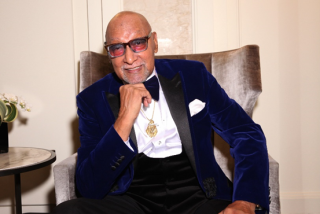JAZZ REVIEW : Wynton Plays Warm Tribute to the Duke
- Share via
“Love you madly!”
It was Duke Ellington’s affectionate phrase, bestowed on any and all who gained his approval. And one could almost hear it resonating through the Wiltern Theatre on Sunday night at the close of Wynton Marsalis’ concert with the Lincoln Center Jazz Orchestra.
Because Ellington would surely have loved what he heard. A good three-quarters of the Orchestra’s program was devoted to the great jazz composer’s works, and it was performed with a combination of respectful elegance and improvisational vigor. In the process, Marsalis and his talented compatriots effectively laid to rest the notion that Ellington’s music--originally written for the specific players in his own ensemble--could not be convincingly interpreted by other musicians.
Marsalis did not make the task easy for himself. He declined to pick such instantly familiar pieces as “Mood Indigo” or “Take the ‘A’ Train.” Instead, he selected lesser-known Ellington items: “Afro Bossa,” “Royal Ancestry” (written for Ella Fitzgerald) and “Wild Man Moore” (for Louis Armstrong), as well as selections from the “Deep South Suite.”
Despite the relative obscurity of the material, the Orchestra established an immediate linkage with an audience.
Marsalis’ skills, both as a leader and a communicator, were constantly in evidence. Bantering gently with the crowd, bringing his listeners into the arena of the music with bits of information and occasional jokes, he established a warm, engaging atmosphere.
At the same time, although he professes to doing little with the Orchestra other than counting off the time, he clearly has molded it into something more than a by-the-numbers repertory ensemble. The problem with jazz as repertoire in the past has usually been the tendency to have the music performed by highly skilled players who produce note-perfect, but emotionally bland simulations of the originals.
In the Lincoln Center Orchestra, however, Marsalis has built a collective musical entity with a character and personality of its own. Its renderings of Ellington, as well as works from the bands of Dizzy Gillespie (“Things to Come”) and Tito Puente (“Mambo Beat”) came to life, not because of the accuracy of the imitations, but because of the Orchestra’s energy and creativity.
The Orchestra’s individual players were universally outstanding: Marsalis’ lip-busting solo on “Things to Come” and his brilliant personification of Louis Armstrong on “Wild Man Moore”; Eric Reed’s thoughtful, consistently imaginative piano, especially on a surging rendition of Ellington’s ingenious train piece, “Happy Go Lucky Local”; Wes Anderson’s Johnny Hodges-inspired series of alto saxophone choruses on “Wild Man Moore”; Ryan Kisor’s warm-toned trumpet on “All Heart”; Milt Grayson’s marvelously rich vocals; Wycliffe Gordon’s rousing trombone; Victor Goines’ high-flying clarinet; and Herlin Riley’s powerful drumming throughout.
But none of this quite describes Marsalis’ complete accomplishment with the Orchestra. Consider, that in the mid-’90s, listeners from young to old were enthusiastically responding to a big band playing music composed four and five decades earlier.
That’s a remarkable achievement, not just for Marsalis and his players, but for Ellington and Gillespie.
More to Read
The biggest entertainment stories
Get our big stories about Hollywood, film, television, music, arts, culture and more right in your inbox as soon as they publish.
You may occasionally receive promotional content from the Los Angeles Times.










